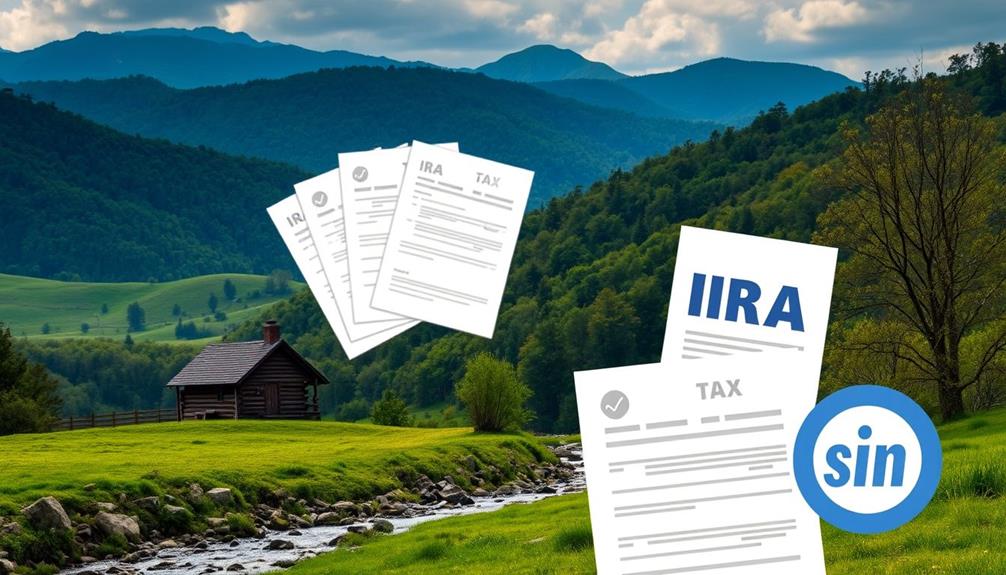If you are taking money out of a Traditional IRA in Virginia, you will have to pay state income tax on those funds since they are considered pension income. The tax rate will vary from 2% to 5.75% based on your overall income. However, individuals who are 65 years old or older can deduct up to $12,000 from their taxable income. Roth IRA withdrawals might be tax-free if the account has been active for a minimum of five years and you are 59 and a half years old or older. It is important to understand these details as they can significantly impact your financial planning. By continuing to learn more, you will discover additional strategies to maximize your retirement income.
Key Takeaways
- Traditional IRA distributions are fully taxable in Virginia, treated as pension income subject to state income tax rates.
- Roth IRA withdrawals are not taxable if the account is at least 5 years old and the individual is 59½ or older.
- Individuals aged 65 and older can deduct up to $12,000 from their taxable income, reducing their overall tax burden.
- Social Security benefits are exempt from Virginia state taxes, providing additional financial relief for retirees.
- Seniors should document IRA withdrawals carefully to maximize available deductions and manage tax liabilities effectively.
Virginia Tax Structure Overview

Virginia's tax structure profoundly impacts how you manage your IRA withdrawals. In Virginia, traditional IRA distributions are fully taxable, similar to pension income, which means these withdrawals contribute to your overall taxable income.
The state employs a progressive income tax system, with rates ranging from 2% to 5.75%, affecting your tax liability based on your total income level. Considering the potential for higher returns with gold as a long-term investment, many retirees are exploring options such as IRA rollovers to gold to mitigate tax impacts.
However, if you're 65 or older, you can benefit from the age deduction that allows you to deduct up to $12,000 from your taxable income. This can greatly reduce the tax burden on your retirement income, including IRA withdrawals.
Additionally, Virginia doesn't tax Social Security benefits, providing a financial advantage if you're relying on multiple income sources.
It's also worth noting that Virginia doesn't impose estate or inheritance taxes, making it easier for you to manage your assets, including your IRAs.
Understanding these aspects of Virginia's tax structure can help you make informed decisions about your withdrawals and overall financial strategy during retirement.
Taxable Retirement Income

When planning your retirement income, it is crucial to understand how different sources of taxable income can impact your financial situation. In Virginia, both Traditional IRA distributions and withdrawals from 401(k) plans are considered taxable income and are subject to state income tax rates ranging from 2% to 5.75%. However, if you're aged 65 and older, you can deduct up to $12,000 of your retirement income, including IRA distributions, from your taxable income.
On the other hand, Roth IRA withdrawals are generally not taxable in Virginia, provided the account has been open for at least five years and you're over 59½ years old. Keep in mind that Adjusted Gross Income (AGI) limits can also affect your eligibility for deductions and credits.
Here's a quick overview of the tax treatment of different retirement income sources in Virginia:
| Retirement Income Source | Taxable in Virginia? |
|---|---|
| Traditional IRA | Yes |
| Roth IRA | No (if conditions met) |
| 401(k) plans | Yes |
| Retirement income (65+) | Deduction available |
| AGI impact | Yes |
Social Security Tax Treatment

Understanding how Social Security benefits are taxed is just as important as knowing the tax implications of other retirement income. In Virginia, you'll be pleased to know that Social Security income isn't subject to state taxes, meaning you can keep your full benefits without worrying about state tax implications.
Additionally, leveraging tax advantages from investments like Gold IRAs can further enhance your financial strategy in retirement. While federal taxation may apply to your Social Security benefits based on your overall income level, Virginia allows you to subtract any federal tax on your Social Security from your state return.
If your total retirement income, including Social Security, is under $12,000, you won't incur any Virginia taxes. This non-taxation enhances the financial appeal of relying on Social Security as a primary income stream for retirees.
However, it's crucial to understand how federal and state tax treatment interacts, as it can greatly influence your overall financial planning.
Deductions for Seniors

As a senior in Virginia, you can take advantage of age-based tax deductions that greatly lower your taxable income.
Understanding the implications of Common Financial Terms can also aid in making informed decisions regarding your retirement account withdrawals.
It's important to understand the income thresholds that determine how much you can deduct from your retirement account withdrawals.
Steering through the deduction application process effectively can help you retain more of your hard-earned retirement savings.
Age-Based Tax Deductions
Seniors in Virginia can take advantage of age-based tax deductions that provide significant financial relief during retirement. If you're aged 65 or older, you can subtract up to $12,000 from your taxable income, which includes retirement income sources like IRA withdrawals. This age-based deduction can substantially lower your Virginia income tax, but it's vital to understand the nuances.
| Income Level | Maximum Deduction | Tax Implications |
|---|---|---|
| Under $12,000 | Up to $12,000 | Lower taxable income, more tax relief |
| $12,000 – $24,000 | Partial deduction | Progressive tax rates apply |
| Over $24,000 | No deduction | Taxed at standard progressive rates |
Your federal Adjusted Gross Income (AGI) plays a significant role in determining the maximum deduction you can claim. Effective financial planning is essential for managing retirement income and optimizing tax relief. By keeping your total retirement income below the threshold, you can maximize this deduction and enjoy a more secure financial future.
Income Threshold Considerations
Maneuvering the income thresholds for tax deductions can greatly impact your financial strategy in retirement. In Virginia, seniors aged 65 and older can deduct up to $12,000 from their taxable income, markedly reducing the tax burden on IRA withdrawals. However, these deductions depend on your adjusted gross income (AGI), with limits set at $62,000 for single filers and $87,000 for married couples filing jointly.
To navigate these income threshold considerations effectively, keep in mind:
- Every dollar counts when managing retirement income.
- Unexpected tax burdens can derail your financial plans.
- Understanding deductions can lead to substantial savings.
- A proactive approach empowers you to make informed decisions.
- Peace of mind comes from knowing your financial landscape.
Traditional IRA distributions are taxed as regular income in Virginia's progressive income tax system, meaning income over the $12,000 deduction is taxed between 2% and 5.75%.
Deduction Application Process
Maneuvering the deduction application process can feel overwhelming, but understanding the steps can simplify the experience. In Virginia, seniors aged 65 and older can deduct up to $12,000 from their taxable income, which includes IRA withdrawals and other sources of retirement income.
To qualify for this deduction, you must guarantee your Adjusted Gross Income (AGI) doesn't exceed specific thresholds. For single filers, the phase-out begins at $62,000, while married couples face a phase-out at $87,000.
When you file your state income taxes, properly documenting your IRA withdrawals is essential. This documentation will help you maximize the benefits of the deduction, ultimately lowering your taxable income and potentially reducing your tax liability.
If you were born on or before January 1, 1939, you can claim the full $12,000 deduction. However, if you were born after this date, your deduction may vary based on your income level.
Local Tax Relief Options

Steering through the local tax landscape in Virginia can lead to significant savings for retirees. By exploring local tax relief options, you can reduce your overall tax burden and enhance your affordability.
Many cities and counties offer specific relief measures for seniors and individuals with disabilities, which may include:
- Exemptions or reductions on personal property tax
- Real estate tax relief based on assessed value
- Tax freeze programs that lock in your property taxes
- Eligibility criteria based on income thresholds
- Tailored tax breaks that suit your financial situation
Understanding these localities' programs can make a big difference in your financial comfort.
For instance, some localities provide tax freeze programs that prevent property taxes from increasing as long as you meet certain income thresholds.
It's essential to check with your local Commissioner of Revenue or Finance offices to uncover the available tax breaks and relief measures.
Engaging with these local tax relief options can truly enhance your quality of life in retirement, allowing you to enjoy your golden years without the stress of rising taxes.
Don't miss out on the potential savings waiting for you!
Retirement Planning Strategies

Exploring local tax relief options can lay a solid foundation for your retirement, but effective retirement planning strategies go a step further by considering how your IRA withdrawals impact your overall financial picture.
In Virginia, traditional IRA withdrawals face state income tax, which can reach up to 5.75%. However, as a senior aged 65 or older, you can deduct up to $12,000 from your taxable income, greatly easing your tax burden.
To optimize your retirement income, consider timing your IRA withdrawals. If your total taxable income remains below $12,000, you mightn't owe any state income tax on these withdrawals. Additionally, Roth IRA distributions typically incur no state taxes, making them an appealing choice for tax-sensitive retirees.
Strategic planning also involves consulting a tax professional. They can help you navigate the complexities of federal and state tax implications, ensuring you maximize tax benefits while complying with Virginia's regulations.
Comparing State Tax Policies

Comparing state tax policies is crucial for retirees looking to maximize their income. In Virginia, traditional IRA withdrawals are subject to state income tax, with rates between 2% and 5.75% depending on your taxable income.
While seniors aged 65 and older can deduct up to $12,000 from their taxable income, which includes IRA distributions, this can still complicate your retirement planning.
Consider these key points when evaluating Virginia's tax landscape:
- Virginia taxes IRA withdrawals, impacting your overall retirement income.
- You can benefit from deductions that may lower your tax liability.
- Social Security benefits remain untaxed, allowing more income retention.
- Compared to states like Florida and Texas, Virginia's tax can feel burdensome.
- Adjusted gross income limits may phase out deductions, affecting your net income.
Understanding these nuances is critical.
While you enjoy the benefits of Social Security in Virginia, managing your IRA withdrawals effectively can help you navigate your tax situation more strategically, ensuring a financially secure retirement.
Frequently Asked Questions
Are IRA Withdrawals Taxable in Virginia?
Yes, IRA withdrawals are generally taxable in Virginia. Traditional IRA funds count as taxable income, while Roth IRA withdrawals aren't taxed since they come from after-tax contributions. Be sure to check your adjusted gross income for deductions.
Do You Pay State Taxes on IRA Withdrawals?
When you dip into your IRA, think of it like opening a treasure chest—there's a tax price to pay. Yes, you'll owe state taxes on those withdrawals, depending on your income level.
What Is the Tax Break for Seniors in Virginia?
In Virginia, you can benefit from a state income tax subtraction of up to $12,000 on your retirement income if you're 65 or older. This deduction helps you manage your finances more effectively during retirement.
Does Virginia Tax VRS Benefits?
Yes, Virginia does tax VRS benefits as pension income. While you might feel this is unfair, seniors 65 and older can deduct up to $12,000, easing your overall tax burden considerably.
Conclusion
In Virginia, understanding state tax implications for IRA withdrawals can feel like maneuvering a winding river. Just as a seasoned kayaker anticipates the currents, you can plan your retirement strategy to avoid unexpected tax rapids. By knowing how your retirement income is taxed and leveraging available deductions, you can steer your financial future toward calmer waters. Remember, staying informed and proactive guarantees you enjoy the journey ahead without unnecessary bumps along the way.









